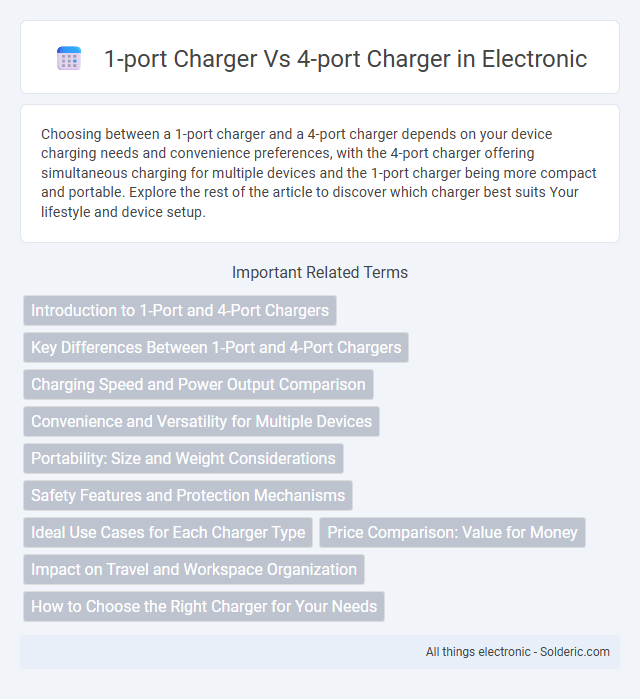Choosing between a 1-port charger and a 4-port charger depends on your device charging needs and convenience preferences, with the 4-port charger offering simultaneous charging for multiple devices and the 1-port charger being more compact and portable. Explore the rest of the article to discover which charger best suits Your lifestyle and device setup.
Comparison Table
| Feature | 1-Port Charger | 4-Port Charger |
|---|---|---|
| Number of Devices | Charges 1 device at a time | Charges up to 4 devices simultaneously |
| Charging Speed | Single device optimized speed | Multiple ports may reduce individual device speed |
| Port Types | Usually 1 USB-A or USB-C port | Mix of USB-A and USB-C ports |
| Size & Portability | Compact and highly portable | Bulkier due to additional ports |
| Power Output | Typically 18W to 30W | Combined output varies, often 45W to 120W |
| Use Case | Ideal for single device users | Best for multi-device charging at home or office |
| Price | Generally lower cost | Higher cost due to more ports and power |
Introduction to 1-Port and 4-Port Chargers
A 1-port charger is designed for charging a single device at high speed, making it ideal for users who prioritize simplicity and portability. In contrast, a 4-port charger allows multiple devices to charge simultaneously, providing convenience and reducing the need for multiple outlets. Your choice depends on whether you need to power just one device quickly or several devices at once.
Key Differences Between 1-Port and 4-Port Chargers
A 1-port charger offers a single charging output, ideal for simple, on-the-go use where only one device needs power at a time, providing focused and faster charging per port. In contrast, a 4-port charger accommodates multiple devices simultaneously, delivering convenience and reducing clutter, though individual charging speeds may vary based on total wattage distribution. Your choice depends on whether you prioritize dedicated rapid charging or simultaneous multi-device support.
Charging Speed and Power Output Comparison
A 1-port charger typically delivers higher charging speeds per port due to its ability to allocate full power output to a single device, often reaching up to 20W or more for fast charging. In contrast, a 4-port charger divides its total power output, which can range from 50W to 100W, across multiple devices, potentially reducing charging speed when several devices are connected simultaneously. Your choice depends on whether you prioritize maximum speed for one device or the convenience of charging multiple devices at once with moderate power distribution.
Convenience and Versatility for Multiple Devices
A 4-port charger offers superior convenience by allowing you to simultaneously power multiple devices, reducing clutter and the need for multiple outlets. Its versatility supports various charging needs, accommodating smartphones, tablets, and other USB-powered gadgets all at once. In contrast, a 1-port charger limits your ability to charge multiple devices at the same time, which can be less efficient for your busy lifestyle.
Portability: Size and Weight Considerations
A 1-port charger offers superior portability due to its compact size and lightweight design, making it ideal for travel and minimalistic setups. In contrast, a 4-port charger tends to be bulkier and heavier, which can limit portability but provides the convenience of charging multiple devices simultaneously. Choosing between the two depends on the balance between ease of transport and the need for multiple charging ports in one device.
Safety Features and Protection Mechanisms
1-port chargers often include basic safety features such as over-current protection and short-circuit prevention, but 4-port chargers typically offer advanced, multi-layered protection mechanisms including over-voltage, over-temperature, and surge protection for each port. The integration of smart detection technology in 4-port chargers enhances safety by optimizing power delivery and minimizing risks associated with device overheating or electrical faults. Choosing a 4-port charger provides comprehensive safety and reliable protection for charging multiple devices simultaneously, ensuring your equipment remains secure.
Ideal Use Cases for Each Charger Type
A 1-port charger is perfect for users who need to charge one device quickly and efficiently, ideal for travel or single-device setups like smartphones or tablets. A 4-port charger suits families, offices, or tech enthusiasts who require simultaneous charging of multiple devices such as phones, laptops, smartwatches, and tablets, optimizing space and reducing clutter. Choosing the right charger depends on the number of devices, power requirements, and the convenience of centralized charging.
Price Comparison: Value for Money
A 1-port charger typically costs less upfront, making it a budget-friendly option for minimal device charging needs. In contrast, a 4-port charger offers greater value for money by efficiently powering multiple devices simultaneously, reducing the need for multiple outlets and chargers. Investing in a multi-port charger can save both time and money in the long run, especially for households or offices with several electronic devices.
Impact on Travel and Workspace Organization
A 1-port charger offers simplicity and compactness, making it ideal for minimalists and short trips where space is limited. A 4-port charger enhances efficiency by allowing multiple devices to charge simultaneously, reducing clutter and optimizing workspace organization. Your choice between these chargers directly affects how streamlined your travel packing and desk setup can be.
How to Choose the Right Charger for Your Needs
Choosing the right charger depends on your device usage and charging habits; a 1-port charger is ideal for minimal device charging and compact needs, delivering focused power output for faster charging per device. A 4-port charger offers versatility and convenience by allowing simultaneous charging of multiple devices, making it perfect for households or professionals with several gadgets. Consider power output (measured in watts or amps), portability, and device compatibility when selecting between single and multi-port chargers to optimize efficiency and charging speed.
1-port charger vs 4-port charger Infographic

 solderic.com
solderic.com